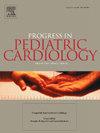Mindfulness based stress reduction program in teenage patients with a cardiac implanted electronic device
IF 0.6
Q4 PEDIATRICS
引用次数: 0
Abstract
Background
Increased psychosocial stress and decreased quality of life (QOL) are commonly seen in adolescents with cardiac implanted electronic devices (CIEDs). Mindfulness based stress reduction (MBSR) interventions have been shown to decrease psychosocial stress and improve QOL in cardiovascular patients.
Objective
This pilot study assessed the feasibility and effectiveness of an MBSR-teen (MBSR-T) program in adolescents with CIEDs.
Methods
Patients aged 14–21 with CIEDs for >1 month enrolled and completed an 8-week MBSR-T course. The program was implemented in two formats: an in-person program for the first cohort of participants and a virtual program for the second cohort. Participants completed pre and post-program surveys: Peds Quality of Life Short Form (PedsQL 4.0 SF), Florida Patient Acceptance Survey (FPAS), and a post-program qualitative survey.
Results
Twelve patients (10 with pacemakers, 2 with ICDs, 8 in-person, 4 virtual) completed the course, with a mean age of 16 ± 2 years. Following the intervention, patients reported significantly greater acceptance of their cardiac implantable devices (t(11) = −2.67, p = 0.022). Although not statistically significant, patients reported clinically relevant decreased depression (mean change [MΔ] = −0.75), increased emotional functioning (MΔ = 1.17), and increased social functioning (MΔ = 0.50). Post-program qualitative survey results showed that all participants (100 %) found the program useful and appropriate in both duration and setting, with 9 participants (75 %) recommending it to other teenagers with CIEDs.
Conclusion
In-person and virtual MBSR-T programs were feasible and demonstrated decreased device-related distress and improved device acceptance in children with CIEDs.
心脏植入电子设备的青少年患者的正念减压计划
心理社会压力增加和生活质量下降在植入心脏电子设备(cied)的青少年中很常见。正念减压(MBSR)干预已被证明可以减少心血管患者的心理社会压力并改善生活质量。目的本初步研究评估了MBSR-T治疗cied青少年的可行性和有效性。方法14-21岁的cied患者病程1个月,接受为期8周的MBSR-T课程。该计划以两种形式实施:第一组参与者的面对面计划和第二组参与者的虚拟计划。参与者完成了计划前和计划后的调查:儿科生活质量简短表格(PedsQL 4.0 SF),佛罗里达州患者接受调查(FPAS),以及计划后的定性调查。结果12例患者(带起搏器10例,带icd 2例,亲历8例,虚拟4例)完成疗程,平均年龄16±2岁。干预后,患者对心脏植入装置的接受度显著提高(t(11) = - 2.67, p = 0.022)。虽然没有统计学意义,但患者报告临床相关的抑郁减少(平均变化[MΔ] =−0.75),情绪功能增加(MΔ = 1.17),社会功能增加(MΔ = 0.50)。项目后的定性调查结果显示,所有参与者(100%)都认为该项目在持续时间和环境方面都是有用和合适的,其中9名参与者(75%)向其他患有cied的青少年推荐该项目。结论面对面和虚拟MBSR-T方案在cied患儿中是可行的,并能减少设备相关的困扰,提高设备接受度。
本文章由计算机程序翻译,如有差异,请以英文原文为准。
求助全文
约1分钟内获得全文
求助全文
来源期刊

PROGRESS IN PEDIATRIC CARDIOLOGY
PEDIATRICS-
CiteScore
0.90
自引率
11.10%
发文量
69
审稿时长
75 days
期刊介绍:
Progress in Pediatric Cardiology is an international journal of review presenting information and experienced opinion of importance in the understanding and management of cardiovascular diseases in children. Each issue is prepared by one or more Guest Editors and reviews a single subject, allowing for comprehensive presentations of complex, multifaceted or rapidly changing topics of clinical and investigative interest.
 求助内容:
求助内容: 应助结果提醒方式:
应助结果提醒方式:


